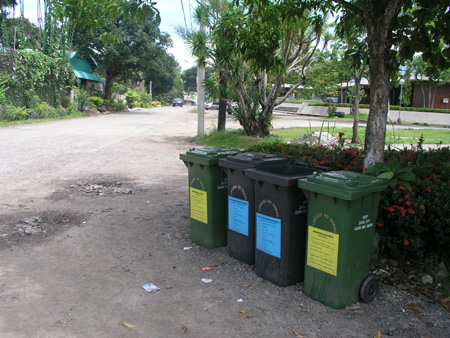By Cheryll D. Fiel
davaotoday.com
DAVAO CITY � The trash bins look expensive. These are placed strategically in practically every street corner in several �pilot� areas in the city, as if telling the public that there�s no excuse for littering and — this is important — segregating garbage.
To put it bluntly, you could go to jail for ignoring what the bins are for. And City Hall says it is serious in implementing this waste-segregation scheme.

Violators, said Ann Silvosa of the City Environment and Natural Resources Office (Cenro), would be punished either by forcing them to do community service or to sweep the streets themselves. Unsegregated garbage, she said, won�t be collected.
The waste-segregation campaign, launched third week of May, basically aims to inculcate in Davaoe�os the practice of segregating biodegradable and non-biodegradable waste.
Through its �garbage collection modernization program,� City Hall, through a loan, recently acquired 20,000 bins and 10 compactor trucks. The bins were distributed in all barangays, whose leaders are tasked to oversee the implementation of the campaign.
City Hall�s waste segregation scheme is a requirement for the rehabilitation of its dumpsite, which would be turned into a sanitary landfill. Once completed, only residual waste or garbage that are of no use at all are supposed to be thrown in there.
The city generates as much as 650 tons of garbage every day, one of the largest in the country. For years, the city�s wastes were dumped in the open dumpsite in Barangay Carmen, Tugbok District.
Then came the Ecological Solid Waste Management Act of 2000, a law signed in January 2000 that prohibits the use of open dumpsites. It all ordered local governments to convert open dumpsites into �controlled dumpsites� by February 2004. And all controlled dumpsites are supposed to be phased out by last February, to be replaced by sanitary landfills.
City Hall has been trying to come up with more than 200 million pesos to put up a sanitary landfill in compliance with the law. Under this law, charges could be filed against the mayor if he failed to produce a landfill.
While Mayor Rodrigo Duterte can rest easy for now � the DENR�s Environment Management Bureau told davaotoday.com it is unlikely that the mayor would be charged yet, because the city is already trying to implement a sanitary landfill project � this has been a major headache for City Hall.
For one thing, looking for a landfill, which should be at least 20 hectares, can be quite difficult. For another, coming up with the 200 million pesos is not easy, according to City Administrator Wendel Avisado.
City Hall�s option now was to use its unreleased internal revenue allotment (IRA) as a collateral for a loan to finance the landfill project. Avisado said he was sure the city will have its landfill within the year, as promised by the mayor.
For now, Avisado said, the city would be better off upgrading its garbage-collection capabilities, implement the segregation scheme, and buy trash bins and compactors. And, we might add, demand a certain amount of civic duty from Davaoe�os. Considering that Duterte is this country�s most respected, if feared, mayor, that should be easy. (Cheryll D. Fiel/davaotoday.com)










